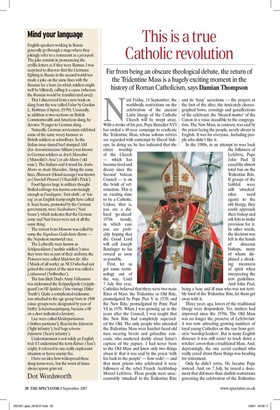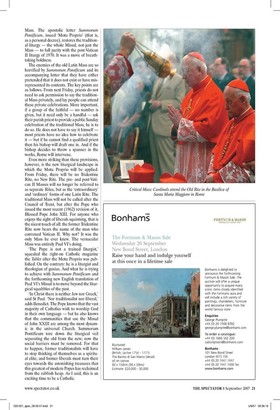This is a true Catholic revolution
Far from being an obscure theological debate, the return of the Tridentine Mass is a hugely exciting moment in the history of Roman Catholicism, says Damian Thompson Next Friday, 14 September, the worldwide restrictions on the celebration of the ancient Latin liturgy of the Catholic Church will be swept away. With a stroke of his pen, Pope Benedict XVI has ended a 40-year campaign to eradicate the Tridentine Mass, whose solemn rubrics are regarded with contempt by liberal bishops. In doing so, he has indicated that the entire worship of the Church — which has become tired and dreary since the Second Vatican Council — is on the brink of reformation. This is an exciting time to be a Catholic. Unless, that is, you are a diehard 'go-ahead' 1970s trendy, in which case you are probably hoping that the Good Lord will call Joseph Ratzinger to his reward as soon as possible.
First, let us get some terminology out of the way. Until 7 July this year, Catholics believed that there were two main Rites of Mass: the Tridentine or Old Rite, promulgated by Pope Pius V in 1570; and the New Rite, promulgated by Pope Paul VI in 1970. When I was growing up in the years after the Council, I was taught that the New Rite had completely superseded the Old. The only people who attended the Tridentine Mass were hatchet-faced old men wearing berets and gabardine raincoats, who muttered darkly about Satan's capture of the papacy. I had never been to the Old Mass and knew only two things about it: that it was said by the priest 'with his back to the people' — how rude! — and that most priests who celebrated it were followers of the rebel French Archbishop Marcel Lefebvre. These people were unaccountably 'attached' to the Tridentine Rite and its 'fussy' accretions — the prayers at the foot of the altar; the intricately choreographed bows, crossings and genuflections of the celebrant; the 'blessed mutter' of the Canon in a voice inaudible to the congregation. The New Mass, in contrast, was said by the priest facing the people, nearly always in English. It was for everyone. Including people who didn't like it.
In the 1980s, in an attempt to woo back the followers of Lefebvre, Pope John Paul II eased the almost total ban on the Tridentine Rite. If groups of the faithful were still 'attached' (that word again) to the old liturgy, they could approach their bishop and ask him to make provision for it. In other words, the decision was left in the hands of diocesan bishops, many of whom displayed a shocking meanness of spirit when interpreting the new guidelines. And John Paul, being a busy and ill man who was not terribly fond of the Tridentine Rite, let them get away with it.
Three years ago, lovers of the traditional liturgy were despondent. Yes, matters had improved since the 1970s. The Old Mass was no longer the preserve of Lefebvrists: it was now attracting growing numbers of loyal young Catholics on the run from geriatric 'worship leaders'. But in many English dioceses it was still easier to track down a witches' coven than a traditional Mass. And, depressingly, the one curial cardinal who really cared about these things was heading for retirement.
Only he didn't retire. He became Pope instead. And, on 7 July, he issued a document that did more than abolish restrictions governing the celebration of the Tridentine Mass. The apostolic letter Summorum Pontificum, issued 'Motu Proprio' (that is, as a personal decree), restores the traditional liturgy — the whole Missal, not just the Mass — to full parity with the post-Vatican II liturgy of 1970. It was a move of breathtaking boldness.
The enemies of the old Latin Mass are so horrified by Summorum Pontificum and its accompanying letter that they have either pretended that it does not exist or have misrepresented its contents. The key points are as follows. From next Friday, priests do not need to ask permission to say the traditional Mass privately, and lay people can attend these private celebrations. More important, if a group of the faithful — no number is given, but it need only be a handful — ask their parish priest to provide a public Sunday celebration of the traditional Mass, he is to do so. He does not have to say it himself — most priests have no idea how to celebrate it — but if he cannot find a qualified priest then his bishop will draft one in. And if the bishop decides to throw a spanner in the works, Rome will intervene.
Even more striking than these provisions, however, is the new liturgical landscape in which the Motu Proprio will be applied. From Friday, there will be no Tridentine Rite, no New Rite. The preand post-Vatican II Masses will no longer be referred to as separate Rites, but as the 'extraordinary' and 'ordinary' forms of one Latin Rite. The traditional Mass will not be called after the Council of Trent, but after the Pope who issued the most recent (1962) revision of it, Blessed Pope John XIII. For anyone who enjoys the sight of liberals squirming, that is the nicest touch of all: the former Tridentine Rite now bears the name of the man who convened Vatican II. Why not? It was the only Mass he ever knew. The vernacular Mass was entirely Paul VI's doing.
'The Pope is not a trained liturgist,' squealed the right-on Catholic magazine the Tablet after the Motu Proprio was published. On the contrary: he is a liturgist and theologian of genius. And what he is trying to achieve with Summorum Pontificum and the forthcoming new English translation of Paul VI's Missal is to move beyond the liturgical squabbles of the past.
'In Christ there is neither Jew nor Greek,' said St Paul. 'Nor traditionalist nor liberal,' adds Benedict. The Pope knows that the vast majority of Catholics wish to worship God in their own language — but he also knows that the communities that use the Missal of John XXIII are among the most dynamic in the universal Church. Summorum Pontificum tore down the liturgical veil separating the old from the new; now the social barriers must be removed. For that to happen, former traditionalists will have to stop thinking of themselves as a spiritual elite; and former liberals must turn their eyes towards the astonishing treasures that this greatest of modern Popes has reclaimed from the rubbish heap. As I said, this is an exciting time to be a Catholic.




































































 Previous page
Previous page